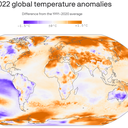2022 was the world's fifth-warmest year on record

The past eight years were the eight warmest years on record, and 2022 was the fifth-warmest on record globally, according to the European Union's Copernicus Climate Change Service.
Why it matters: The ranking, released Tuesday morning, shows the planet continues its long-term warming trend in response to growing amounts of greenhouse gases.
- Each of the past 8 years had global average temperatures more than 1°C above the preindustrial level, as the world nears the 1.5°C guardrail established by the Paris Climate Agreement.
- Studies show that the odds of potentially catastrophic climate impacts increase significantly if warming exceeds 1.5°C compared to preindustrial levels.
Of note: The third year in a row of La Niña conditions in the tropical Pacific Ocean helped depress global average surface temperatures slightly, keeping 2022 from hitting the top three warmest years.
- There are signs, however, that La Niña may soon wane, and potentially give way to an El Niño event during 2023.
- If this were to happen, it would raise the chances for a new all-time record warm year.
The big picture: Global average temperatures in 2022 were 0.3°C (0.54°F) above the 1991-2020 baseline, and the year was the second-warmest on record for Europe, behind 2020.
- Europe had its hottest summer on record, accentuated by all-time record high temperatures set in several countries, including the United Kingdom.
- The UK Met Office has found 2022 was its warmest year on record dating all the way to 1659. It was also its first year with an average temperature above 10°C (50°F). France also had its hottest year.
- Areas that saw their warmest year on record include large parts of western Europe, the Middle East, Central Asia and China, northwestern Africa and the Horn of Africa, among others, Copernicus found.
- Worldwide, extreme heat struck Pakistan and northern India during the spring before devastating flooding rains hit the region in late summer. Central and eastern China saw record hot and dry conditions for an extended period over the summer.
Between the lines: Studies tied these and other extreme weather and climate events to human-driven climate change.
- Research published in September found that climate change may have increased five-day rainfall amounts in the hardest-hit areas of Pakistan by up to 50%.
- Another climate attribution study found that the U.K. heat wave, which peaked in mid-July, was at least 10 times more likely to occur in today's warmer climate compared to the preindustrial era.
Of note: There were a fair share of precipitation extremes in 2022 as well, with the floods in Pakistan, extreme drought in the Horn of Africa that is pushing that region into a famine, and a series of record floods in Australia.
What's next: Annual numbers are expected later this week from NOAA and NASA.